UPDATE: By an overwhelming 89.5% (317-yes to 37-no), we voted in favor of Sinai Postdoctoral Organizing Committee-UAW (SPOC-UAW) as our union!
We have a clear choice in this election. Voting “YES” means Mount Sinai administrators would have a legal obligation to bargain with our elected postdoc representatives over pay, benefits and workplace rights, and to secure any agreements on improvements or maintaining current benefits in a legally binding and enforceable contract. We will be joining 100,000 UAW academic employees in working together to make research workplaces more just, fair, and equitable.
Over the course of hundreds of conversations, we’ve seen that Mount Sinai Postdocs share many of the same challenges. These include increasing bureaucratic hurdles for international workers, unpredictable salary increases that don’t match the skyrocketing cost of living in New York City, lack of paid parental leave, and insufficient recourse for sexual harassment, discrimination, and bullying. These challenges add unnecessary stress to the postdoc experience and make it more difficult to focus on doing quality research.
Right now, Sinai administrators decide unilaterally if, how, and when to address problems affecting postdocs. With collective bargaining, we will be able to meet at the bargaining table as equals. With strong participation and support in our vote we can negotiate a contract that not only improves our pay, benefits, and workplace rights, but also ensures the security and stability that enables us to do quality research. With the continuity of a certified union, we can project our voices beyond the campus and build a more connected community within it.
In hundreds of conversations, and in town halls and other meetings, postdoctoral researchers have already identified some of the common priorities that we could address through a contract. Consider the thoughts of our colleagues and these basic reasons to vote “union yes” in person on June 22-23.

Sinai postdocs connected with unionized colleagues at Columbia University from UAW Local 4100, and other researchers from around the city, at a picnic to kick-off the summer.
Fair workplace standards enable postdocs to prioritize research.
As postdocs, our work powers Sinai’s research mission — we make valuable contributions that have earned Sinai international renown and bring in the funding that supports day-to-day operations. We do it in the most expensive city in the country, in the face of generationally-high inflation, with a minimum salary that has remained unchanged since 2018.
In 2020, postdocs at Columbia approved their first union contract and took their minimum salaries from the lowest for postdocs in New York City to the highest In doing so, they helped raise the standard for other NYC institutions. It is time for us to come together and demand salaries and other benefits that reflect the value of our contributions, and to secure them in a contract, so we can focus on the quality of our research instead of how to make ends meet.
How have other postdocs used a union contract to improve compensation?
University of California postdocs have negotiated the highest pay of any public university postdocs
“The first ever postdoc union at a private US university has been formed”
See the positive results of collective bargaining for other UAW academic workers
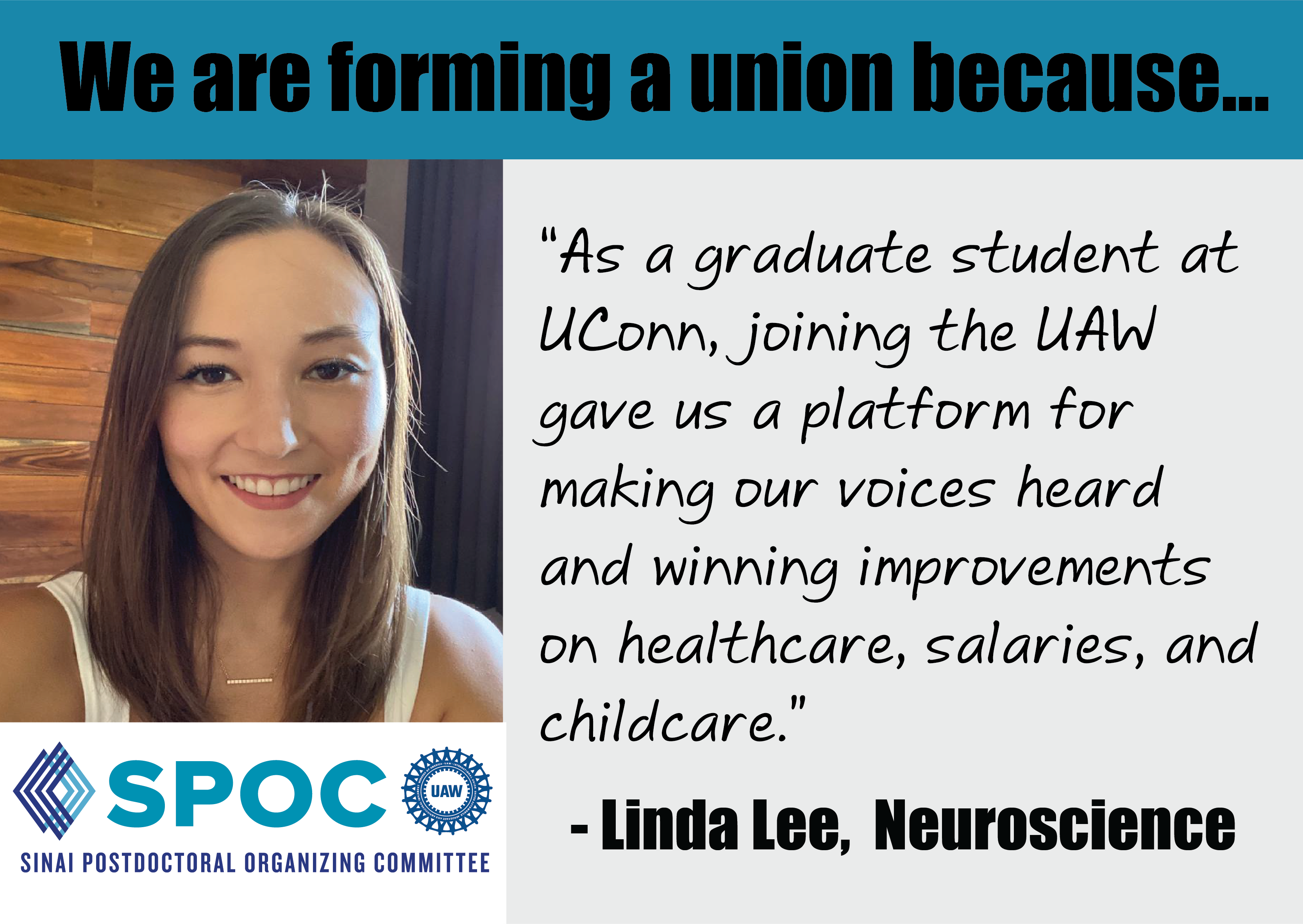
Collective bargaining can create a more accessible postdoc experience.
As postdocs, many of us spend upwards of 50 hours a week in the lab. And because of the high cost of living and housing and a lack of institutional support, many of us, especially those with children, are forced to live increasingly far from work, at a moment in our postdocs when we have the most experience in our labs and provide the most value to the institute. Spending hours commuting each day is bad for our families and takes time away from our research and and has placed unnecessary pressure on researchers in the midst of a pandemic. Standing together we can demand better support and negotiate changes that improve quality of life.
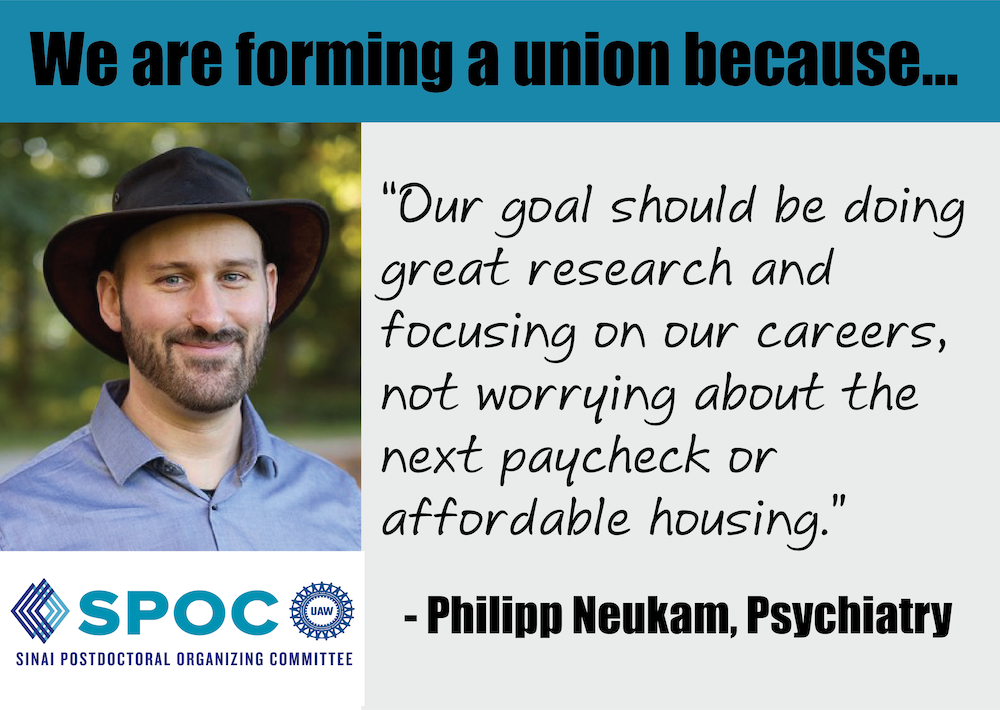
How have postdocs at other institutions used a contract to improve the postdoc experience?
Read about the growth of postdoc unions in Inside Higher Ed
Read about all the improvements UC postdocs have negotiated to improve and stabilize their work
A stronger voice to advocate for International Worker rights.
As International Researchers at Mount Sinai, we are voting “yes” for our Union
With 100,000 academic workers across the US, including postdocs, RAs and TAs, and non-tenure-track faculty, the UAW nationally and locally has become a leading voice advocating for expanded opportunities for international students to transition to early-career research positions in the US after graduation and for robust federal investment in science research. UAW academic workers’ advocacy work also played a key role, alongside others like NIH director Francis Collins, ensuring the inclusion of postdocs in the 2016 federal overtime rules that established significant improvements to postdoctoral salaries.
The UAW’s commitment to international researchers and scholars stems from the leadership of international researchers and scholars themselves. Postdoc and graduate employee unions affiliated with UAW are often led by international students and scholars, who serve in top leadership positions in local unions nationwide.
Joining together with other academic workers in the UAW has become more urgent than ever as recent government actors have waged unprecedented attacks on science, sexual harassment protections, and the rights of international scholars.
Letter to the editor: UAW is a strong ally for international students and postdocs
As International Researchers at Columbia University we are voting Yes for our Union
Read about UC postdoc and UAW efforts to support federal science funding
UAW 5810 Resolution To Mt. Sinai Postdocs on International Researcher Rights
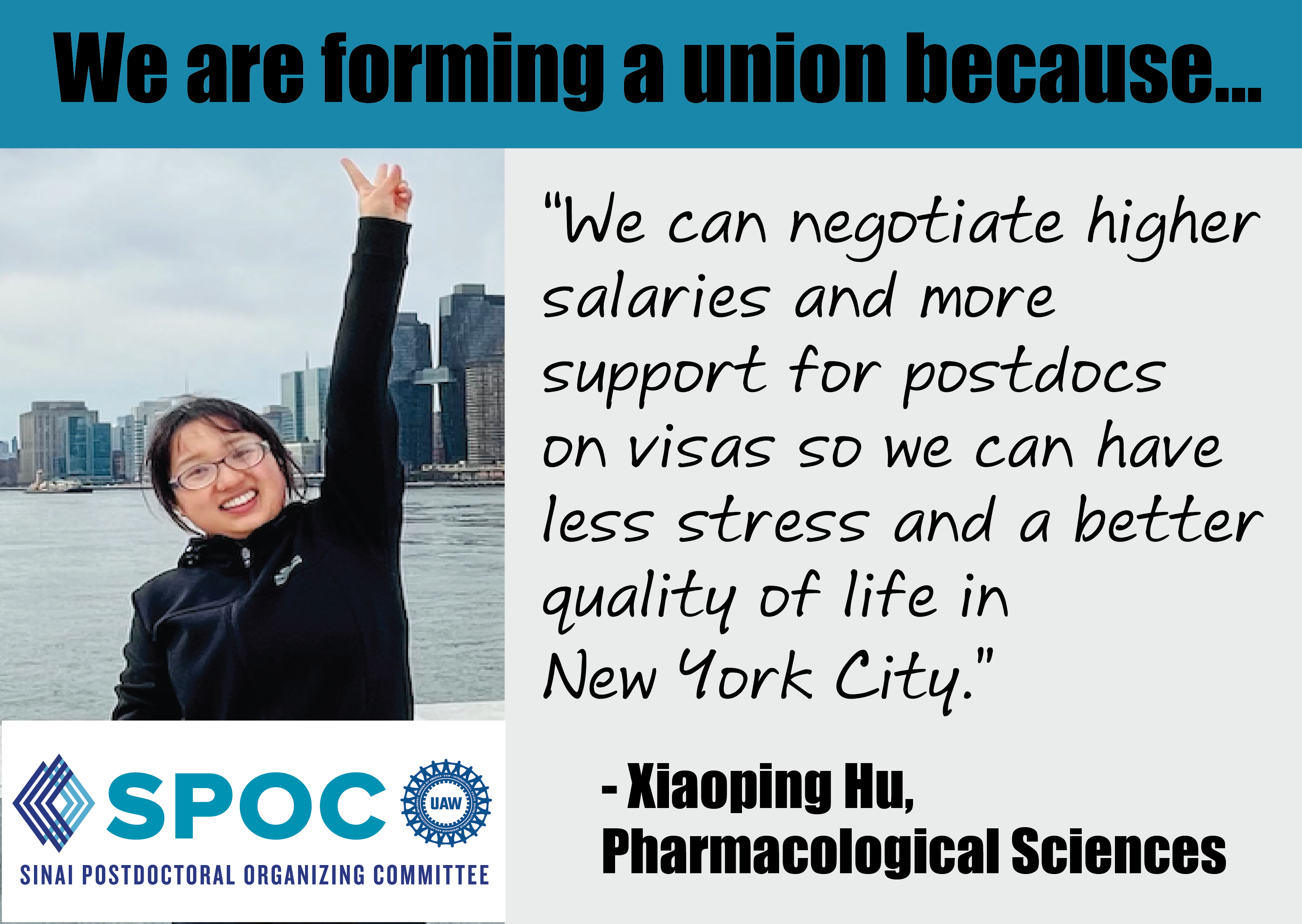
Our research is stronger when everyone can contribute.
Vote ‘UNION YES’ for a Mount Sinai that supports parents
Pregnancy, childbirth and adoption should be occasions for celebration – without unnecessary stress caused by having to return to work too soon after giving birth, or concerns about unstable benefits, housing, or visa status. Unfortunately, this kind of stress is all too prevalent for postdoc parents. More women are obtaining Ph.D.s in science than ever before, but those women — often due to discrimination and unequal pressures on postdocs choosing to have a family — are far more likely than men to leave academia before obtaining tenure at a college or university.
Under-representation of women in senior roles has been a longstanding problem within academia, and that’s why winning significant improvements in this area is so important.
Read how other postdocs have unionized and made their employers more family friendly.
Why Columbia postdoc parents voted “YES” for a more family-friendly research community
Columbia graduate workers win fully-paid dependent health insurance
Columbia Postdocs Win Emergency Child Care Subsidy During Pandemic
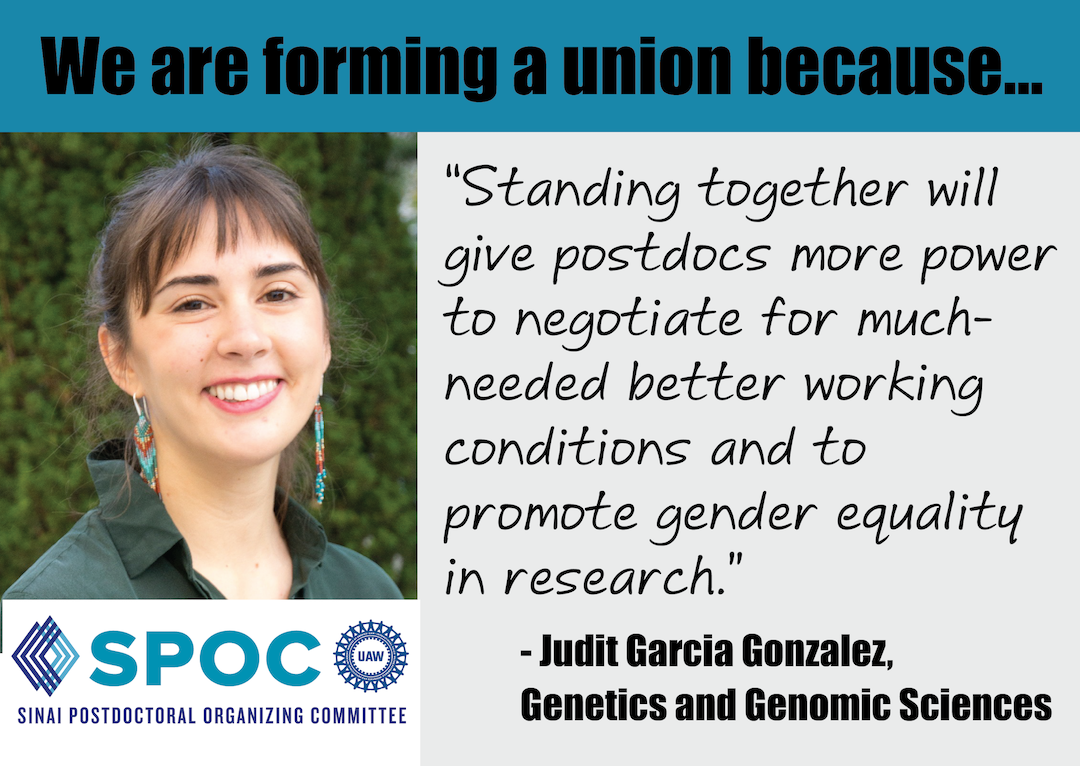
Together we can make Sinai more equitable and inclusive.
Inequalities — including those based on gender, race, sexual orientation and immigration status — continue to create barriers for many of the most talented to enter the academic and scientific workforce. And existing systems of recourse for problems like discrimination, harassment, and bullying too often fail and can take years. Though much work remains to be done, postdocs, graduate students and adjunct faculty in the UAW have helped make progress on many of these issues, both at the bargaining table and in policy advocacy through the UAW. At the University of Connecticut, for example, a graduate assistant worked with her union to successfully resolve a major sexual assault and harassment complaint in three months, whereas complaints of gender and race-based discrimination against Sinai leadership have remained unresolved years later.
Discrimination Lawsuit Against Mount Sinai Health System Moves Ahead
UConn Graduate Student Union Helps Handle Sexual Harassment
Columbia Postdoc Union Develops University-Wide Anti-Bullying Policy
“Workplace Bullying in Higher Education is Rampant. We’re Fighting Back”
UC International Postdoc Takes on Pregnancy Discrimination and Wins
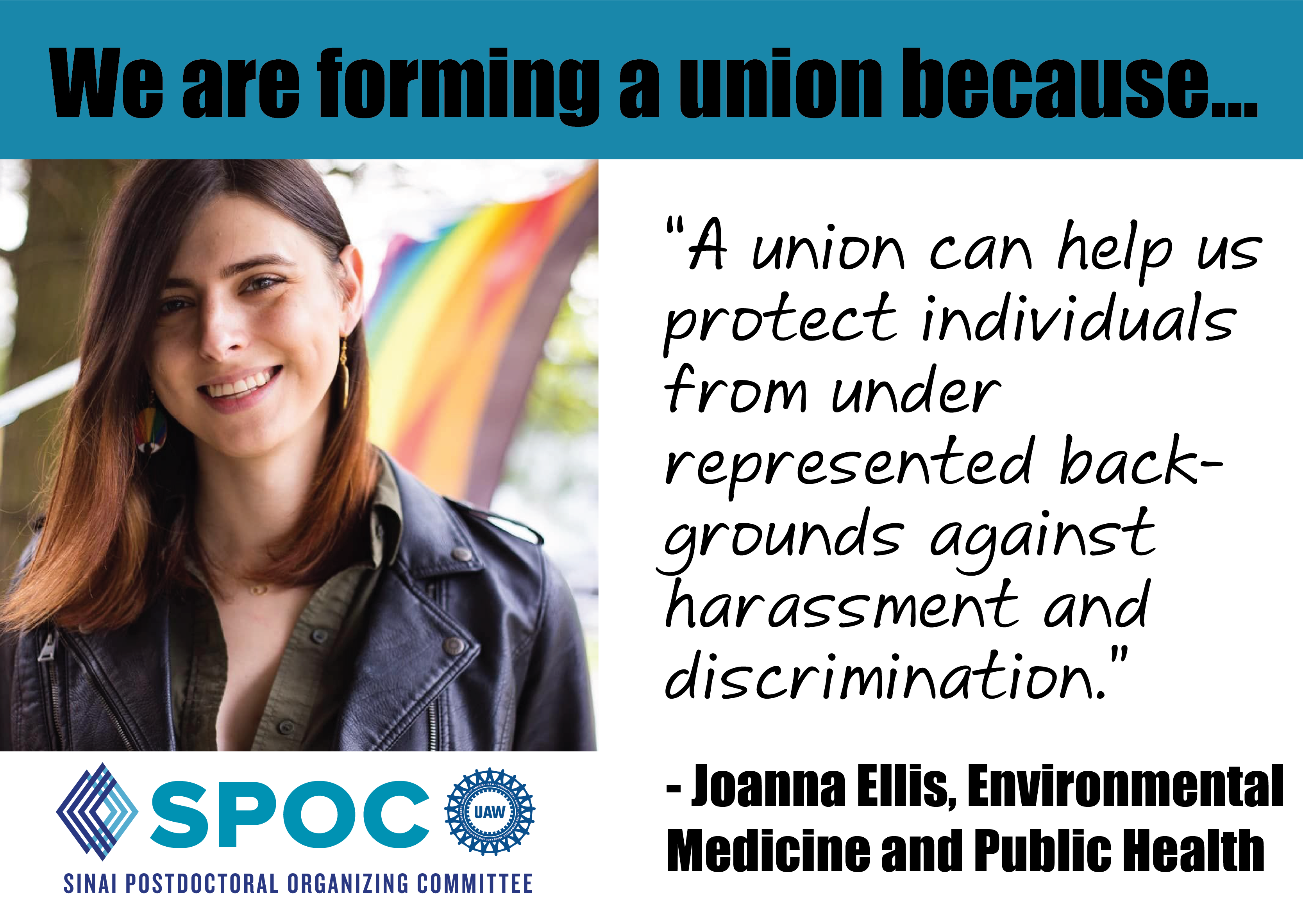
We are voting YES for our union, Sinai Postdoctoral Organizing Committee-UAW (SPOC-UAW)!
On June 22 and 23rd, we will have the opportunity to vote “union yes” at Mount Sinai. In doing so, we would join tens of thousands of unionized academic workers across the US, including thousands of postdoctoral researchers who have already come together to improve the postdoc experience and create a more equitable, inclusive, and fair scientific community.
As postdocs, we play a critical role in driving the world-class research conducted at Mount Sinai. However, without collective bargaining, Sinai postdocs have faced unreliable salary increases that lag behind the rising cost of living, lack of clear recourse in cases of mistreatment, and insufficient support for international researchers and parents, among other challenges. This uncertainty unnecessarily hinders our ability to focus on quality research.
If a majority of us vote “yes” for SPOC-UAW as our union, the Sinai administration would be legally obligated to bargain with postdocs over salaries, benefits and workplace rights, and to commit any agreements into a binding contract.
We therefore urge our colleagues to vote ‘yes’ for SPOC-UAW as our union, so that we have the strongest possible mandate to bargain a fair union contract with the Mount Sinai administration that improves our working conditions and our lives.
Signed,
Cecilia Alcala, Environmental Medicine and Public Health
Sheema Almozyan, Immunobiology
Emre Altinmakas, Radiology
Mario Amatruda, Neurology
Alba Amorós, Genetics and Genomic Sciences
Nanditha Anandakrishnan, Medicine – Nephrology
Ruth Arias, Psychiatry
Lukas Bethlehem, Genetics and Genomic Sciences
Bhavya Bharathan, Medicine – Endocrinology, Diabetes and Bone Disease
Enamul Bhuiyan, Radiology
Paola Bianchimano, Neurology
Bruna Bortoleti, Immunobiology
Kevin Braunscheidel, Neuroscience
Artemis Briasouli, Psychiatry
Alice Buonfiglioli, Oncological Sciences
Jillian Carmichael, Microbiology
Feng-kuei Chiang, Neuroscience
Anjalika Chongtham, Neurology
Maria Cirnaru, Neurology
James Clark, Cell Development and Regenerative Biology
Pablo Cuelar, Environmental Medicine and Public Health
Oded Danziger, Microbiology
Anichavezhi Devendran, Cardiovascular Research Institute
Romain Donne, Oncological Sciences
Sohini Dutta, Neuroscience
Joanna Ellis, Environmental Medicine and Public Health
Catherine Elorette, Neuroscience
Tristan Fehr, Neuroscience
Ruben Fernandez-rodriguez, Oncological Sciences
Pooja Flora, Cell Development and Regenerative Biology
Satoka Fujimoto, Neuroscience
Jennifer Gansau, Orthopedics
Judit Garcia Gonzalez, Genetics and Genomic Sciences
Marta Garcia-forn, Psychiatry
Pankaj Gaur, Neuroscience
Daniel Greene, Pediatrics
Elena Grossi, Oncological Sciences
Shalaila Haas, Psychiatry
Christine Hansen, Psychiatry
Mike He, Environmental Medicine and Public Health
Samarth Hegde, Immunobiology
Xiaoping Hu, Pharmacological Sciences
Annika Hunziker, Microbiology
Shakti Ingle, Pharmacological Sciences
Keira Johnston, Genetics and Genomic Sciences
Sina Jostes, Oncological Sciences
Prashath Karunaraj, Oncological Sciences
Kirtan Kaur, Environmental Medicine and Public Health
Adrianna Kepinska, Genetics and Genomic Sciences
Mohsina Khan, Psychiatry
Alja Kozulic-Pirher, Oncological Sciences
Gregory Kronberg, Psychiatry
Piyush Kumar, Environmental Medicine and Public Health
Emelie Lassen, Medicine – Nephrology
Linda Lee, Neuroscience
Wonjun Lee, Genetics and Genomic Sciences
Rodolphe Leforestier, Radiology
Meng-yen Li, Cell Development and Regenerative Biology
Rachel Litke, Neuroscience
Anthony Lozano, Oncological Sciences
Kaixiu Luo, Pharmacological Sciences
Douglas Mansell, Medicine
Pratheek Marthanda, Genetics and Genomic Sciences
Irene Martin, Microbiology
Tiphaine Martin, Oncological Sciences
Mauro Martinez, Environmental Medicine and Public Health
Elliot Merritt, Genetics and Genomic Sciences
Vishal Midya, Environmental Medicine and Public Health
Clare Miller, Neurology
Hilary Monaco, Genetics and Genomic Sciences
Isha Monga, Genetics and Genomic Sciences
Ananya Mukherjee, Medicine – Haematology and Medical Oncology
Philipp Neukam, Psychiatry
Balagopal Pai, Pathology
Rukmani Pandey, Psychiatry
Camila Patino, Oncological Sciences
Anh Phan, Cardiovascular Research Institute
Sanjana Pillay, Cell Development and Regenerative Biology
Xing Qiu, Pharmacological Sciences
Samir Rahman, Genetics and Genomic Sciences
Ana ramos, Oncological Sciences
Susana Isabel Ramos, Pathology
Nikhil Rasinghani, Cardiovascular Research Institute
Elza Rechtman, Environmental Medicine and Public Health
Maria Rios de Anda, Psychiatry
Ananda Rodilla, Medicine – Haematology and Medical Oncology
Miguel Rodriguez, Psychiatry
Carolina Rodriguez-Tirado, Pharmacological Sciences
Romel Rosales, Microbiology
Constantin Ruprecht, Genetics and Genomic Sciences
Estefani Saint-jour Cubillos, Neuroscience
Anirudh Sattiraju, Neuroscience
Paulo Schenkel, Immunobiology
Lauriane Sedes, Pharmacological Sciences
Saren Seeley, Psychiatry
Shishir Singh, Medicine – Gastroenterology
Nishant Soni, Genetics and Genomic Sciences
Fnu Sonia, Microbiology
Agrima Srivastava, Psychiatry
Alan Stern, Medicine – Nephrology
Saraswathi Subramaniyan, Neurology
Raghava Sunkara, Cell Development and Regenerative Biology
Lu Tian, Otolaryngology Administration – ISM
Scott Tyler, Genetics and Genomic Sciences
Sindhu Vangeti, Neurology
Pooja Viswanathan, Neuroscience
Mariana Waldetario, Immunobiology
Bingyan Wang, Medicine – Cardiology
Yajing Xu, Neuroscience
Zhongli Xu, Pharmacological Sciences
Magdalena Zak, Cardiovascular Research Institute
Amira Zarrouk, Psychiatry
Yeqing Zhu, Radiology
